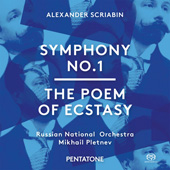
ESSENTIAL RECORDINGS

It goes without saying that the piano music of Alexander Scriabin (1872-1915) is some of the most emotionally charged, visionary, spiritually expansive, and mind blowing music ever
written. Especially when you consider the period during which it was composed. Trying to come to a full understanding of it all, from the early Preludes to the final Sonata, could be compared to
trying to fathom the size of the universe. I've always considered Scriabin to be the musical equivalent of philosophers like Nietzsche, Sartre or Camus. Always reaching and searching for the next reality.
He didn't write music for the piano but rather music to be performed on the piano. This may sound like one and the same, but to me those two concepts are worlds apart. He didn't compose based
on the instrument's limitations, but rather imposed his creativity upon the instrument to overwhelming effect.
Now concerning his orchestral music and more specifically the two works featured on this new recording. My introductory exposure to his Symphony No. 1 in E Major, Op. 26
was courtesy of a bad (suggestive opinion) recording on the Melodiya label released in 1963 with the USSR State Symphony Orchestra conducted by Yevgeny Svetlanov. The sound and interpretation
were so lackluster as to have me convinced that Scriabin was not a good orchestrator and may even have felt mal à l'aise writing for the orchestra. I actually dismissed this symphony
as boring and uninspired because of that and focused all of my attention on his piano music instead. This new recording on the Pentatone label with the Russian National Orchestra
conducted by Mikhail Pletnev is so good that it's transfigured this work and turned it into a revelation for me. Pletnev captures and conveys the essence of Scriabin within the
music. Just listening to the first two minutes or so of the opening movement gradually taking form under his direction, allows Scriabin's distinct harmonic style and use of long intervals to stand out,
and to reveal the profound beauty of this movement. This composer's typical agitated state is very well expressed in the faster inner movements, but again it's in the slower final movement that
Pletnev and his musicians really shine. It's a movement scored for two solo voices and choir that comes very close to landing in Mahler territory. Soprano Svetlana Shilova and
tenor Mikhail Gubsky, along with the Chamber Choir of the Moscow Conservatory sing so well as to elevate the quality of the music by a few more levels.
I've never heard this movement, or the whole symphony for that matter, done so well and expressed with so much conviction.
If you've heard The Poem of Ecstasy (Symphony No. 4) I'm sure you will agree that its an exceptional orchestral tour de force. If you haven't you really should.
With its combination of Ravel refinement, Richard Strauss orchestral touches, the Dionysian flair of Stravinsky and Scriabin's own explosive expressive powers, it is quite a moving experience.
Again here Mikhail Pletnev blends all of these conflicting elements together very well and, taking his cue from the music itself, paces himself and holds everything back until
a tremendous level of energy is finally released near the end and the floodgates of emotion are open. Some conductors here have been either to weak or to heavy and plodding, but Pletnev's
pace and grasp of the sonic landscape are bang on the money, and the members of the orchestra give it all they've got, and project a moment of expressive elation like no other.
If you don't know the music of Alexander Scriabin, this new recording is a great place to take the plunge into his deep harmonic waters.
Jean-Yves Duperron - August 2015